EuropeWeWant interviews: Views from around the world
Azra Sayeed, Rights of Equity, Pakistan
Maria Theresa Nera Lauron, Asia-Pacific Research Network
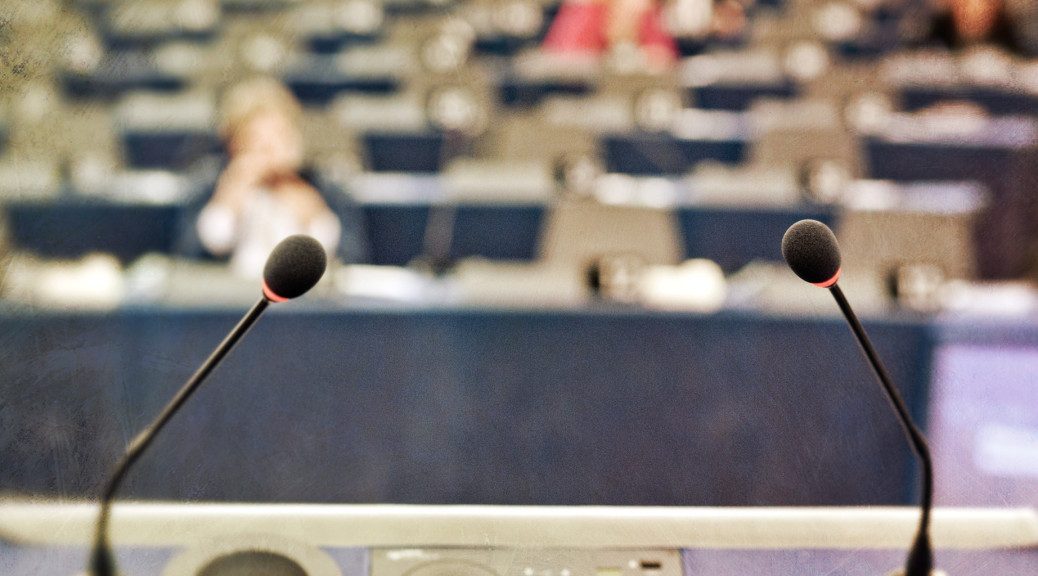
EuropeWeWant interviews: Views from around the world
Azra Sayeed, Rights of Equity, Pakistan
Maria Theresa Nera Lauron, Asia-Pacific Research Network
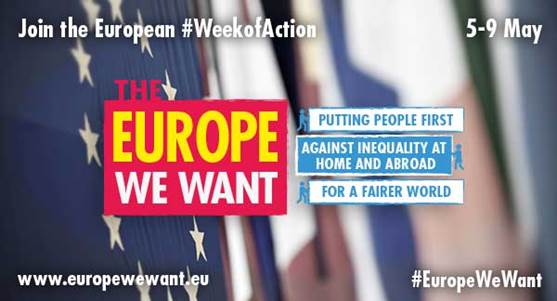
Verso un’Europa solidale: equità, inclusione, cooperazione,pari opportunità.
Incontro con i candidati e le candidate alle elezioni europee
Livestreaming
Video intervista:
5 maggio 2014 – Ore 10-13
Roma, Sala Cristallo Hotel Nazionale, Piazza Montecitorio 131
La cittadinanza attiva e le organizzazioni di terzo settore vogliono un’Europa solidale, più equa, inclusiva e di pari opportunità. Vogliono Candidati e un Parlamento europeo che si impegnino per affermare strategie politiche e azioni coerenti con questa idea di Europa.
Lunedì 5 maggio, nell’ambito della campagna europea The Europe We Want, Il Forum Nazionale del Terzo Settore e CONCORD Italia un organizzano un incontro con i Candidati al Parlamento europeo di tutte le forze politiche, con le organizzazioni e con le Campagne della società civile italiana, per presentare l’appello “Verso un’Europa solidale” a cui hanno già aderito Candidati di diversi schieramenti politici.
Le organizzazioni chiedono un impegno concreto su cinque punti specifici:
- Rafforzare la dimensione sociale dell’Unione economica e monetaria, valorizzando l’economia sociale e tutti i soggetti di terzo settore
- Combattere la povertà e la diseguaglianza, dare pari opportunità di occupazione a tutti i cittadini e le cittadine europee: giovani, donne, persone con disabilità
- Sostenere l’impegno dell’Europa per lo sviluppo e la lotta alla povertà nel mondo, mantenere gli impegni economici dell’0,7% del PIL, ascoltare le voci della società civile per definire dopo il 2015 una nuova agenda globale per lo sviluppo e la lotta alla povertà
- Riformare le politiche europee sull’immigrazione e impegnarsi per una nuova cultura dell’accoglienza per i migranti, del rispetto dei diritti umani e del co-sviluppo, abbandonando l’ottica dell’Europa “securitaria”
- Promuovere la riforma del sistema finanziario
All’evento sono invitati a partecipare anche giornalisti e operatori dell’informazione. Il documento sarà presentato da Pietro Barbieri, portavoce del Forum nazionale del Terzo Settore, e Francesco Petrelli, portavoce di CONCORD Italia.
Il dibattito sarà moderato da Elisa Marincola, giornalista di RAI NEWS 24
Ufficio stampa:
CONCORD Italia: Francesco Verdolino – 3398129813 – francesco.verdolino@hotmail.it
FORUM TERZO SETTORE: Anna Monterubbianesi – 3477061141 – stampa@forumterzosettore.it
Link utili:
- Forum nazionale del Terzo Settore
- Documento completo “Verso un’Europa Solidale”
Forum Nazionale del Terzo Settore
Il Forum Nazionale del Terzo Settore è il principale soggetto di rappresentanza del Terzo Settore italiano. Si costituisce il 19 giugno 1997 ed è Parte Sociale riconosciuta dal Governo. Vi aderiscono le 70 maggiori organizzazioni nazionali di secondo e terzo livello – per un totale di oltre 94mila sedi territoriali – che operano negli ambiti del volontariato, dell’associazionismo, della cooperazione sociale, della solidarietà internazionale, della finanza etica e del commercio equo e solidale nel nostro Paese. Il Forum Nazionale del Terzo Settore ha come obiettivo principale la valorizzazione delle attività e delle esperienze che le cittadine e i cittadini, autonomamente organizzati, realizzano sul territorio attraverso percorsi che garantiscono giustizia sociale, sussidiarietà e sviluppo sostenibile. Tra i suoi principali compiti, la rappresentanza sociale e politica nei confronti di Governo ed Istituzioni, il coordinamento e il sostegno alle reti interassociative; la comunicazione di valori, progetti e istanze delle realtà organizzate del terzo settore. Sulla base di un patto coerente con quello nazionale si sono costituiti 20 Forum regionali e 55 Forum territoriali (provinciali e locali) cui aderiscono le realtà della società civile che operano a livello territoriale.
CONCORD Italia
CONCORD Italia rappresenta presso la confederazione di CONCORD Europa la rinnovata piattaforma nazionale italiana delle organizzazioni non governative di sviluppo, solidarietà e cooperazione internazionale. È composta dalle principali Ong italiane e dai rappresentanti italiani delle principali famiglie e federazioni internazionali. Rappresenta le Ong e le associazioni che operano in ambito europeo nel campo della cooperazione allo sviluppo, dell’aiuto umanitario, dell’educazione globale, della sensibilizzazione del pubblico, attraverso programmi, progetti e iniziative di lobbying e advocacy e campagne.
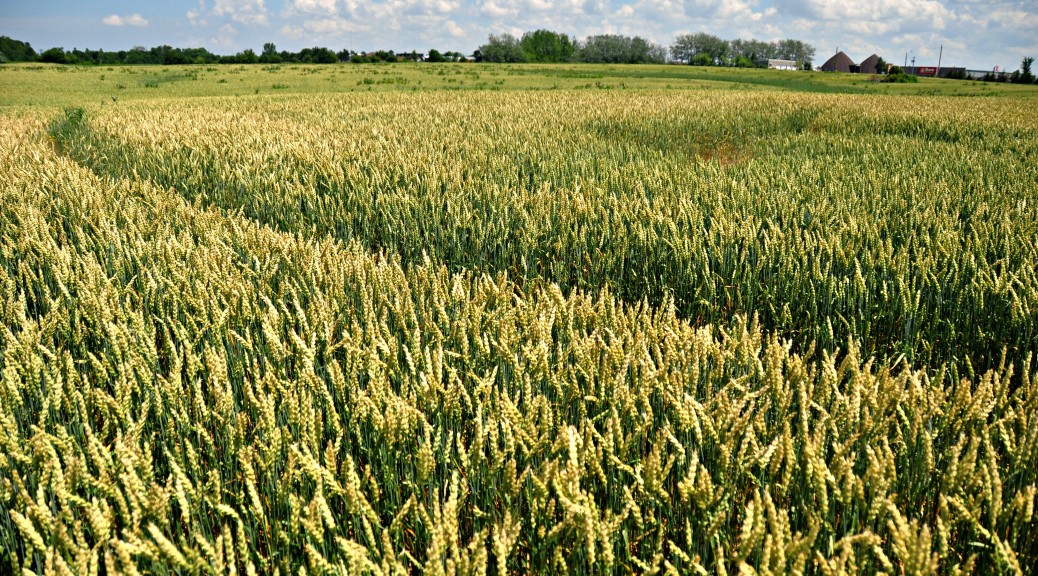
Can you imagine a world in which one in eight go hungry on a daily basis, whilst policies exist that promote burning food as a source of fuel for cars?
Or try this: What about one in which less than one in ten women (the main producers of food in developing countries) have achieved their right to land, whilst multinational companies are given subsidies to grab that same land to produce fuel? Sadly, there is in no need to stretch your imagination to much, because today, this is a reality.
EU laws with good intentions …
Back in 2009, the EU signed off on legislation which promoted the use of food and land in fuel. The Renewable Energy Directive (RED) contained a 10% target for use of renewable energy in transport by 2020, around 88% of which would be filled by first generation biofuels, or fuels that come primarily from food stuffs like corn and oils. The intentions behind this policy seemed to be good; namely, to increase the use of renewables in our energy mix in Europe. The problem however is that we simply do not have enough land available in Europe to meet this target and are grabbing it from poorer regions, where land is easily and more cheaply obtained. On top of this, by diverting food to fuel markets, we are impacting global food markets and causing food price volatility. In countries which are net food importers and where people spend the majority of their daily earnings on food, this is a real problem.
…but increased using food for fuel
What the RED essentially did was to create a decade of fixed demand for biofuels, diverting land away from food production to fuel production, and food into cars instead of onto plates. Ironically, this went in the opposite direction of efforts spearheaded by the EU and its development partners to control hunger and improve rights to food and land globally. At a time when one in eight around the world still face hunger on a daily basis, anti-poverty organisations working within Concord stood up and called for an end to the target. They were joined by many other green organisations like Greenpeace, WWF and Friends of the Earth, who were also concerned about the impact of biofuels on hunger as well as on climate[1]. In 2011, ten international organisations, including the WTO, FAO and World Bank, called for an end to targets and subsidies for biofuels on the basis of their impact on food price volatility.
EP helped in changing the wrong
Some of those calls were ultimately heard in 2012, when the European Commission (EC) agreed to limit the use of food crops in fuel at 5%, subject to agreement by the European Parliament (EP) and Council or Member States. Each of these institutions would play an equal role in fighting out the ultimate deal. To date the Parliament has shown that it is far more progressive and open to the issue of the impact of biofuels on land, food and hunger, than our own Member State governments.
Nonetheless, a tough battle was fought in the European Parliament to defend and strengthen the proposal of the EC to reform the biofuels policy. A heavy biofuels industry lobby argued that around 400,000 jobs would be lost across Europe if the biofuels target was limited, whilst research showed that the reality was less than 3,000[2]. NGOs called for MEPs to look beyond Europe and for food, people and hunger eradication to be their priority. Many MEPs heard that argument, stating that it was not possible for the EU to continue using food as fuel, whilst simultaneously fuelling hunger elsewhere in the world. Still, all kinds of scenarios landed on the negotiating table including one to drop the cap on biofuels outright. And whilst in the final vote, the more conservative forces got their way, seeing a weakening of the cap to 6%, this outcome could have been much worse had the progressive MEPs not made a stand. They have also come out with a far more progressive position in the EP than the deal being discussed by our own member states in the Council to date.
What have we learnt from this?
This example shows us three important points: firstly, EU policy matters, both inside the EU and outside of the EU’s borders. Secondly, the European Parliament plays a significant role in shaping those policies. Thirdly, that the balance of power in the Parliament is currently skewed towards industry in Europe and away from the original values of the EU – human rights, justice, equality – at home and abroad. This imbalance can be rectified in May.
[1] The science shows that biofuels are not the climate change silver bullet they were once were believed to be. Biodiesels emit more CO2 than their fossil fuel equivalents when proper accounting of their impact is carried out i.e. when indirect land use change is taken into account
[2] The biodiesel industry’s figures included the number of farmers producing biofuels crops in Europe. Farmers will not lose their jobs when these incentives are cut as they can divert to other types of production.
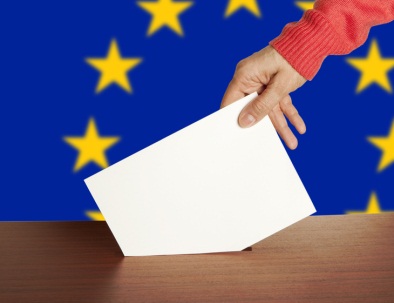
What your vote means for global development issues
If we really want to achieve sustainable development, we need to start by making development work for all, both in Europe and abroad. As long as poverty and inequality persist and as long as there are first and second class citizens we will never achieve this goal.
Your vote at the European elections can make a difference.
The European Parliament has the power to decide how hard the European Union should work for a fairer world. In other words it says how much resources are available to achieve this goal. But it is not just about voting. Who you vote for does make a difference. Here are a couple of issues and ideas you should look for if you want your representative in the EU to work for a fairer world.
Funding the Fight

Are you voting for an MEP who is willing to hold Europe to account for its aid commitments?
Aid plays a unique role in tackling poverty because it is more flexible and less volatile than other forms of finance, especially in times of crisis. Aid also pays for an important share of essential services such as health and education and can be targeted at the poorest communities and countries where other resources are often very scarce. Aid is also essential during humanitarian crisis and emergencies.
Many years ago, EU countries committed to increase aid to 0.7% of the gross national income by 2015. But in 2013, they only managed 0.41% on average.
In light of this disappointment, the European Parliament debated whether EU countries should not only set out a clear roadmap towards meeting this 0.7% target, but legally bind themselves to keeping their promises to developing countries.[1]
In June 2013, MEPs voted in favour of strengthening this commitment by a very small margin, thanks to the combined vote of left, centre-left, green, centrist and a small number of centre-right MEPs, showing above all that in the European Parliament every vote counts.
Click here see how different groups and MEPs from each EU country voted, and who made the difference.
Are you voting for someone who does not want to play with aid figures to paint a different picture?
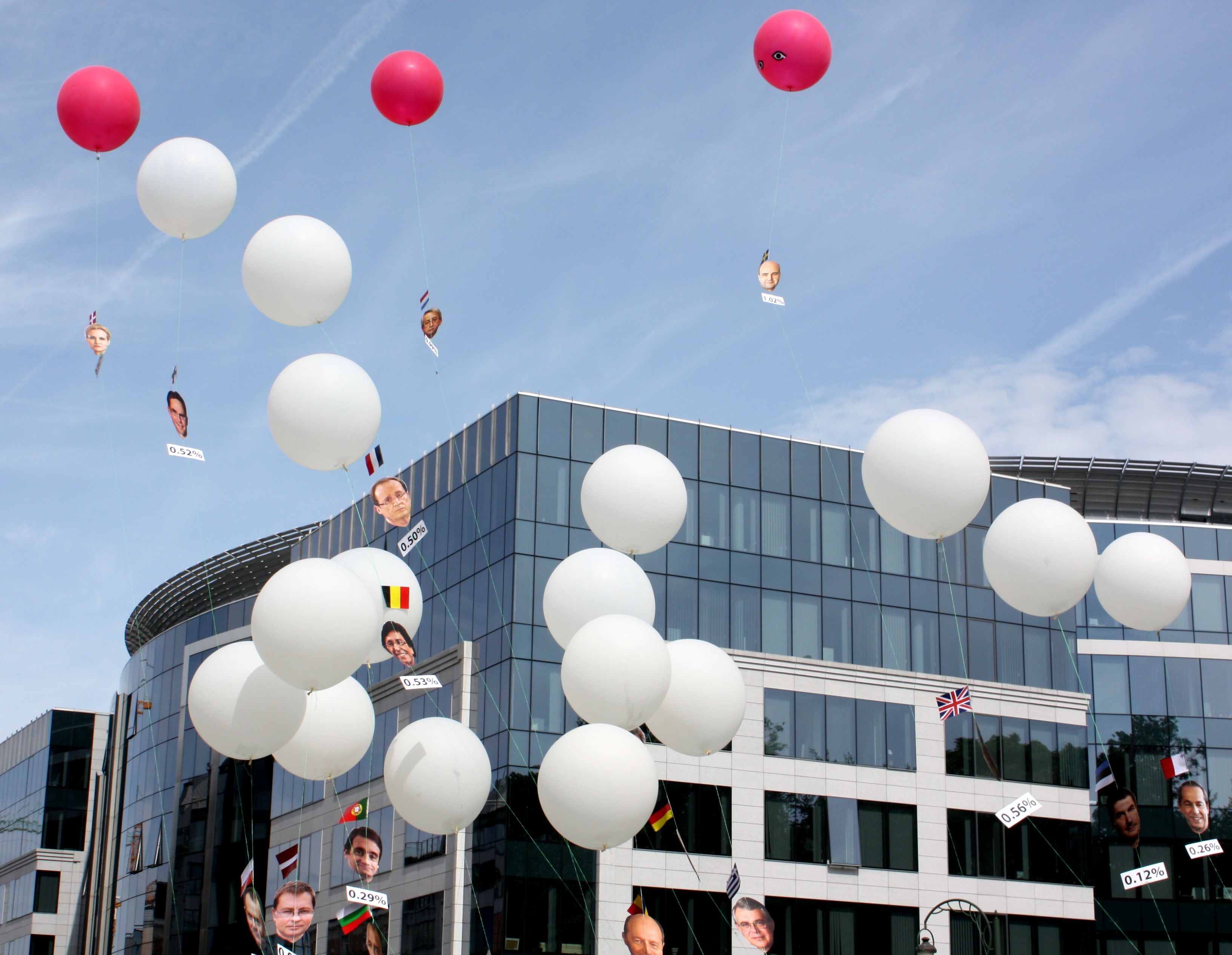
What can be counted as aid is essentially restricted to grants –like a donation, if you want to think about it that way. But a number of countries in the EU are putting pressure to change the definition so that more things can be counted as aid. This is hardly a surprise given the lack of progress on the 0.7% target, but it is a major problem.
Two reasons why: Firstly, broadening the definition and not changing the target is like moving the goal posts in the middle of a game: not very fair. Secondly, they want to include products such as export subsidies, which purely support national industries and have no clear relation to development, or insurance and loan guarantees, which do not entail a transfer of resources to developing countries. Now, not only am I moving the posts but I have also set them further apart so that it is easier to score a goal.
Although the definition of what should be counted as aid is set by the Organisation for Economic Co-operation and Development, the European Parliament is the body that holds the EU to account for delivering on its international commitments and make sure they do so by playing a fair game.
In May 2010, the MEPs clearly showed they agree that EU countries need to play by the rules, with an overwhelming majority voting against any attempt to move the goalposts![2] But not all of them did…click here to see how different groups and MEPs in your country voted.
Are you voting for someone who wants to help developing countries harness and expend their own resources effectively?
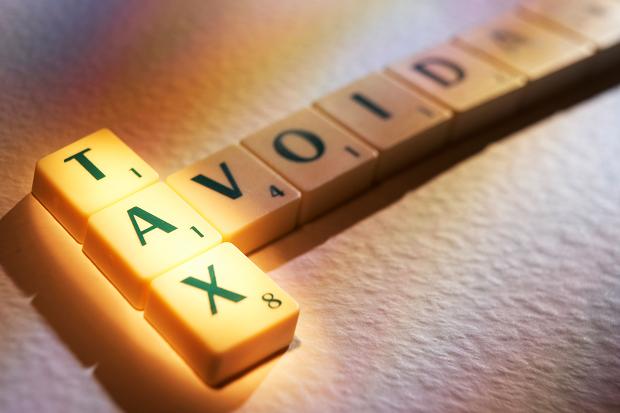
Even if aid plays a crucial role in building a fairer world, especially in the poorest countries, it’s a relatively small with developing countries’ own resources. So, problem solved, you might think. Well not so fast!
The problem is that domestic revenues are scarce and, more importantly, are under attack. In 2008, tax revenues in high income countries represented approximately 30 per cent of GDP. The figure drops to 15 per cent in low income countries. Small GDPs and small revenues mean very little money to spend on things such as health and education. This is the main reason why aid is still necessary to plug the holes.
But let’s go back to the “attack”. Developing countries’ tax systems are constantly abused by reckless individuals and multinational companies. Estimates suggest they lost US$ 946.7 billion in 2011 alone, approximately seven times what they received in aid.
The European Parliament can help to tackle this problem by making it harder for companies to evade taxes and for countries to collect them. In fact, this was one of the motivations behind discussions in the Parliament to request all multinational companies to make their accounts public in each country where they operate instead of aggregating them at the headquarters level. This would help developing countries’ tax authorities as well as reveal whether they are using tax havens to avoid paying taxes.
Following intense negotiations with EU governments, an overwhelming majority of MEPs gave the thumbs up to this initiative in June 2013. Nonetheless, a couple of countries presented some resistance. Guess which ones…
Are you voting for someone who thinks Europe can do more and that we should all contribute according to our resources?
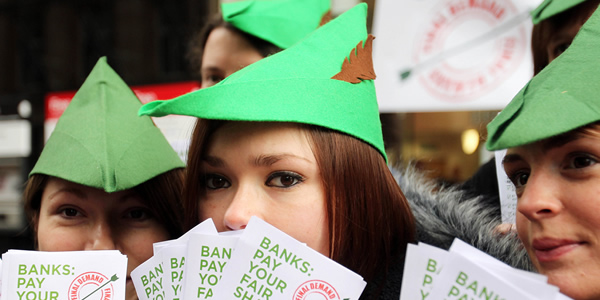
Aid is scarce. It has been said before, but what if we could find additional money for development? There are big ideas out there, one of which is close to being realised in the European Union: a tiny tax on all financial transactions which has the potential to raise significant additional revenues.
The 11 EU countries which have so far decided to put in place this ‘Financial Transaction Tax’ are expected to raise as much as €35 billion a year with a tax on all financial products as has been proposed. With poverty and inequality on the rise across Europe, and around 64 million people worldwide now in poverty, according to the World Bank, due to a financial crisis for which they are certainly not to blame, those responsible should pay their fair share.
A month before MEPs overwhelmingly voted in favour of these 11 EU countries going ahead with this tax, they also reminded them to dedicate a significant part of the money generated both to sustainable development and the fight against climate change.[3] While a number of MEPs declined to do so – click here to see how they all voted – the majority sent a strong signal to these pioneering countries that now is the time for this big idea!
Are you voting for someone who bases all decisions and political actions on fundamental human rights?
Aid can respond to different approaches and objectives. But, irrespective of what kind of model of aid we select or we agree with, there is a core of principles arising from international human rights treaties which call on government institutions and elected representatives, as duty-bearers, to focus on people’s “rights” rather than “needs”.
This is why in the forthcoming elections of MEPs we have all to pay attention on the existence in MEP candidates’ programmes of some indicators which can show us if they are aware about their duties in relations to human rights which apply both within and outside the EU. These “human rights duties” are a crucial component of aid and development policies.
Assessing the capacity of the future MEPs as duty-bearers requires consideration, for example, of the following questions:
Want to find out more?
See all the votes here.
[1] “Recalls the commitment made to allocate 0.7% of gross national income to official development assistance (ODA) by 2015; stresses that this level has to be maintained in a future framework and calls on all Member States to introduce this through binding legislation and to adopt multiannual budget timetables in order to reach the target;”
[2] “Calls on the EU and the OECD not to broaden the definition of development aid (ODA) … ”
[3] “…reminds EU Member States that have agreed to establish the financial transaction tax to devote part of those funds to sustainable development and the fight against climate change;”
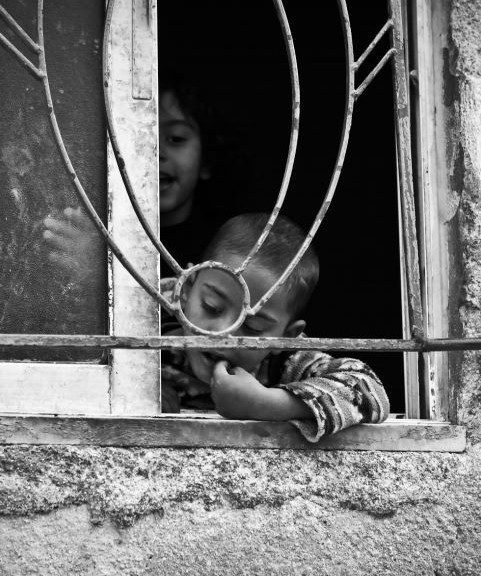
‘If I could, I would rebuild my country Syria. I would put the smile back on its face, without a drop of hatred. Even though I’ve lost hope in any future, still I will dream. My dreams are to continue my education in the field of law and to become a lawyer and defend the oppressed. I want to raise my voice to the entire world”, explained 16-year-old Hasan in World Vision’s Our Uncertain Future report. Continue reading
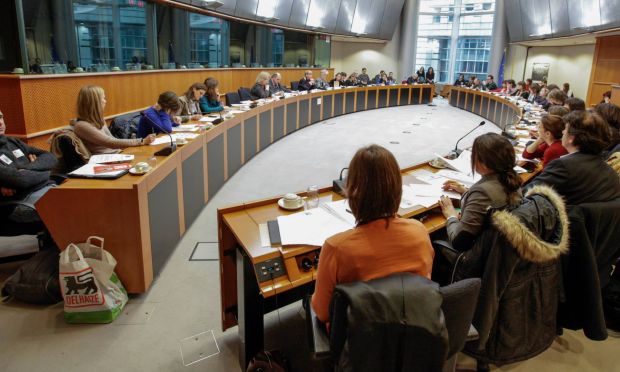
The recent “Pre-Election Dialogue” between child-focused organisations and elected members of the European Parliament was a big success. World Vision was one of the organisations involved in coordinating the event along with other members of the Child Rights Action group (CRAG).
So why did we want a “Pre-Election Dialogue” with Members of the European Parliament?

Europe needs a strong development committee in the next Parliament as the aid debate approaches a crucial juncture, writes Matt Foster
Matt Foster is the Director of Strategy and Programme Effectiveness for Voluntary Service Overseas
One of the last pieces of legislation that the Parliament’s Development Committee (DEVE) approved before MEPs embarked on their 2014 election campaign was a regulation to establish the EU Aid Volunteers Initiative. Through legislation like this, DEVE has become a key player in determining the direction and continued relevance of the EU’s development policy, a role that is set to increase following the European Parliament elections this month.
The new European Parliament Development Committee will form at a crucial moment in international development policy. Negotiations around what happens when the Millennium Development Goals (MDG) expire in 2015 are going to gather pace, and discussions to set a strong post-MDG framework will enter a decisive phase. Simultaneously, the programming of a new seven-year EU development budget will be concluded, and planning for the 2015 European Year of Development will be at full speed. In other words, the members of the next DEVE Committee will not find themselves wanting in terms of important work to tackle.
It is absolutely essential that the upcoming European Parliament elections on the 22-25th of May deliver a group of strong MEPs who, through their involvement in the Development Committee, can deliver on the Union’s development policy.
Voluntary Service Overseas (VSO) is the international development organisation that brings people together to share skills and knowledge to end poverty. We would like to see the forthcoming elections deliver a DEVE Committee that actively engages with the process to agree one global post-MDG development agenda in 2015 and fights for a framework that will be universal, ambitious, transformational and human rights-based.
In particular, the European Parliament must be seen to be doing everything in its power to ensure that people are at the centre of the framework and can participate in decision-making that concerns them. As the only directly elected European institution, the European Parliament must act as custodian of democratic participation, accountability and transparency.
In this respect, VSO insists on equal participation and influence by women in decision-making at all levels. Ensuring a strong gender focus in the EU’s development policy is crucial to securing a successful, sustainable development policy. The UK’s new International Development Gender Equality Act is a landmark example of how a member state can do this by requiring the Secretary of State to consider whether any proposed assistance will reduce poverty in a way which is also likely to contribute to reducing gender inequality, and similarly to take account of gender-related needs before providing humanitarian assistance overseas. Women and girls constitute two-thirds of the world’s poorest people, and women make up 60% of the world’s 572 million working poor. Poverty among women is, in part, caused by gender inequality. The Development Committee needs to play a strong role in making sure that gender is mainstreamed in every EU development programme.
Another crucial role for the DEVE committee is to use its parliamentary oversight powers to follow up on the legislation already passed, like the EU development budget and EU Aid Volunteers Regulation. The latter is a new EU instrument that will harnesses the skills and knowledge of volunteers to support the EU’s work on disaster preparedness and mitigation in countries like Pakistan, the Philippines, India and Bangladesh. It will be up to the committee to focus on delivering lasting outcomes in terms of disaster preparedness and mitigation for the organisations, and ultimately the communities, in the developing countries where the EU Aid Volunteers will be placed. It should also be a priority for the European Parliament to oversee the bulk of the EU Aid Volunteer funds are spent on activities on the ground and not paperwork.
VSO will be keeping a close eye on who gets elected to the new European Parliament and expect them to take their responsibilities seriously for the future shape of the EU’s role in international development is very much in their hands.
Original article published in EurActiv (http://www.euractiv.com/sections/development-policy/sound-development-policies-need-strong-parliamentary-committee-302229)
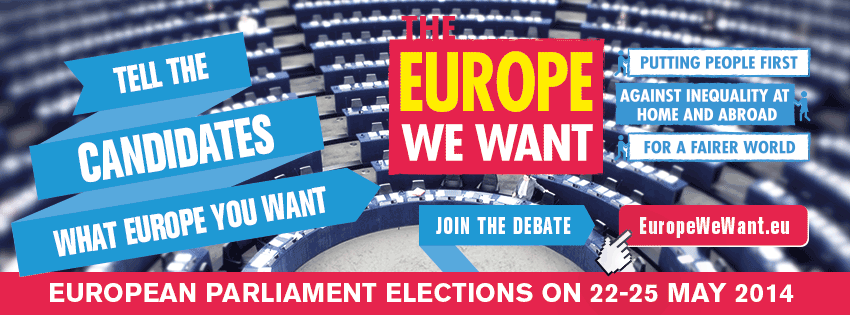
New #EuropeWeWant election campaign – for a fairer Europe at home and abroad
(Brussels, 10/04/2014) The ‘#EuropeWeWant’ is a politically independent campaign that encourages a debate on achieving a fairer Europe at home and abroad at the upcoming European Parliament elections on 22-25 May 2014. Continue reading

European elections 2014: ‘EuropeWeWant’ campaign interview with MEP Hannes Swoboda, President of the S+D group in the European Parliament.
EuropeWeWant will be interviewing candidates from diverse political groups.

By Natalia Alonso, Head of Oxfam’s EU Office
This May, you have the chance to make the Europe you want.
As millions of Europeans from all 28 EU states head to the polls to elect who they want to represent them in the European Parliament for the next five years, it is important we all think about what this election could mean for the EU and the world.
Tough times lie ahead for the poorest people, both in Europe and beyond. And so, more than ever, the European Union should provide the leadership necessary to overcome challenges such as poverty, climate change and the growing gap between the rich and poor. At a time when the world’s 85 richest people own the same wealth as the planet’s bottom half, this final point is more crucial than ever.
Members of the European Parliament (MEPs) play an important role in defining that agenda, so before casting your vote, it is vital to ask what your candidate stands for.
We need tax systems that are both fair and transparent to create a more equal society. In practice this means that everyone should pay taxes according to their means and be able to find out who is playing by the rules and who isn’t.
With high profile cases of multinational companies, such as Apple and Zara, continuing to come to light, the fight for governments to clamp down on the injustice of tax evasion and avoidance continues. The European Parliament has to be at the centre of this, pushing for fairer policies which prevent the loss of billions in illicit flows which steal money from vital public services, such as schools and hospitals, in both Europe and the developing world.
Frighteningly, a staggering $18.5 trillion by wealthy individuals is hidden in offshore. And two-thirds of this money (more than €9.5 trillion) is hidden in EU related tax havens. This means that tax havens in the EU or under its jurisdiction, such as Luxembourg, Andorra or Malta, are facilitating the loss of over €80 billion in tax revenues worldwide.
In a similar way, the European Parliament can act to ensure that food is on the plates of every European and beyond. With over 70% of EU-imported foodoriginating in the climate vulnerable developing world, the Parliament should take a firm stance on climate action, a topic which is also currently being debated at EU level. Your candidate should be able to stand up to dirty old energy industries which consistently represent their interests over those of the people. By pushing through the EU 2030 Climate & Energy package, and showing a willingness to increase emission reduction targets to at least 55%, MEPs can make a real difference in halting the degradation of agricultural land in the developing world,currently gravely under threat from climate change.
The same goes for the European Union’s misguided biofuels policy, which is not only redirecting food for fuel and ramping up greenhouse gas emissions, but also forcing people off their land. Any MEP must be ready to stand against this preposterous rule.
Finally, as the largest overseas aid donor in the world, Europe must continue its work to support a human-rights based development approach in all developing countries. Newly-elected MEPs should ensure that the EU as a bloc has the resources to do so, by resisting the privatisation of aid and by pressuring governments to meet their existing promises to spend 0.7% of their national income as overseas aid, and deliver extra resources to help poor countries cope with increasing climate impacts.
Making sure that all candidates have justifiable answers to these issues is important. By putting climate and development high on the agenda this May we can assure that the Europe we get is a Europe which represents the needs of the people and the planet.
This blog originally appeared here: http://oxfameu.blogactiv.eu/2014/03/14/why-voting-eu-elections-matters/